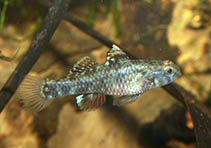| Family: |
Gobiidae (Gobies), subfamily: Gobionellinae |
| Max. size: |
2.22 cm SL (male/unsexed) |
| Environment: |
demersal; freshwater; brackish |
| Distribution: |
Oceania: Northern Australia and New Guinea. |
| Diagnosis: |
Dorsal soft rays (total): 7-7; Anal spines: 1-1; Anal soft rays: 6-6. Distinguished by the following characteristics: small, less than 3 cm SL when adult; indistinct lateral dark speckling and dorsal saddles; scale margins narrowly outlined with dark brown; bright pale blue flecks and spots over brown markings on head, body and fins; first dorsal fin pointed, first spine elongate and pale-coloured in males; first or second spine longest in females but never elongate; second dorsal rays I,7; anal rays I,6; pectoral rays 16-17; longitudinal scales 20-25; TRB 7-10; predorsal scales 6-10; circumpeduncular scales 12 (Ref. 84480). |
| Biology: |
Found in mangroves, among rock and mangroves or in muddy of sandy-muddy estuarine habitats (Ref. 84480). |
| IUCN Red List Status: |
Not Evaluated (N.E.) Ref. (130435)
|
| Threat to humans: |
harmless |
Source and more info: www.fishbase.org. For personal, classroom, and other internal use only. Not for publication.

